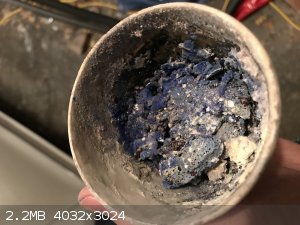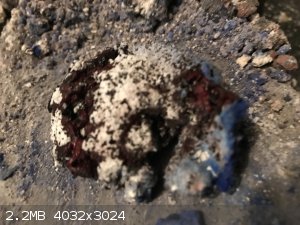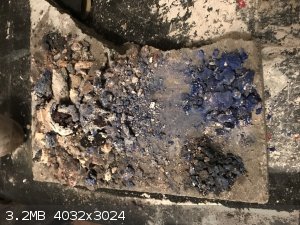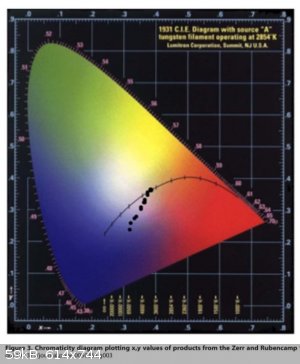| Pages:
1
2 |
Arcaeca
Hazard to Self
 
Posts: 70
Registered: 24-8-2019
Location: Kansas, USA
Member Is Offline
Mood: brøthér, can you spare some B̲̺̹̙̑́̓́ͧ̎ͭ̈́͜L̰̦̼̻͈͖̺͔̇̇̿ͪ̓̃̽ͦŲ̘̲̻͔̀͌͑͑̊͛̑̀͊̕E̐ͮͯ͆̔̾͘͏҉̥̫
|
|
I don't have a practical way to measure the temperature. I mean, a pyrometer would be the most obvious solution, but I don't have a pyrometer.
I was thinking of building an electric furnace (since they tend to cost $2000 if you buy them), and I found a tutorial for doing so, but since I have
no experience building anything electrical, I tried asking around for advice (stuff like "attach alligator clips to the heating element wire, connect
alligator clips to the controller, connect controller to a surge protector, connect surge protector to the outlet, right?" and "does DC vs. AC matter
if I just want to get a wire hot (and if not, would my 30V 10A DC power supply work)) - but nobody gave me any useful answers and just kept telling me
not to do it. So I eventually gave up on it.
Anyway, the better fuel supply got the furnace so hot that:
the bricks the furnace is made of are falling apart
one crucible cracked and its lid shattered
the water bath I put on top - to heat up a mixture of copper(II) sulfate and sodium metabisulfite to boiling, to make Chevreul's salt - got so
hot that it literally smelted the Chevreul's salt and deposited a chunk of copper on the bottom of the vessel that I can't get out
I believe this is what we in the business refer to as "suffering from success".
Anyway, this last run was a catastrophic failure. I did two crucibles at once; one I spilled 90% of its contents while trying to retrieve it from the
furnace, but what I had left had no trace of blue. The other one - the cracked one with the broken lid - had no blue either.
Why is ultramarine so hard to make what the hell
|
|
|
G-Coupled
Hazard to Others
  
Posts: 287
Registered: 9-3-2017
Member Is Offline
Mood: Slightly triturated
|
|
Sounds like you're on your way to sucess. Keep at it!
It's not too hard at all to build an electrical heater - you're just shoving current down a resistance wire at the end of the day. So long as you've
wound an amount of suitable gauge wire that's in the right ballpark in length and know its resistance, you can quite easily calculate what's needed.
A simple thermocouple would be sufficient to measure the temperature, or you could invest in an inexpensive IR thermometer.
[Edited on 15-12-2019 by G-Coupled]
|
|
|
Arcaeca
Hazard to Self
 
Posts: 70
Registered: 24-8-2019
Location: Kansas, USA
Member Is Offline
Mood: brøthér, can you spare some B̲̺̹̙̑́̓́ͧ̎ͭ̈́͜L̰̦̼̻͈͖̺͔̇̇̿ͪ̓̃̽ͦŲ̘̲̻͔̀͌͑͑̊͛̑̀͊̕E̐ͮͯ͆̔̾͘͏҉̥̫
|
|
I tried again with both crucibles, including the cracked one. I put a couple pieces of brick that chipped off the interior walls of the furnace in top
of the crucible as a crude, loose-fitting lid and hoped for the best. It doesn't seem to have mattered and may have even helped, because the yield of
useably-large blue pieces was larger than ever before. I also left the top of the furnace uncovered, which may have somehow affected it; the fire also
nearly went out at one point (from what I can tell, because some non-flammable rubble blocked much of the oxygen intake) and had to be re-ignited,
which resulted in some temperature swings that may also have affected it.
The yields was still not uniformly blue, but as said before, more blue was recovered than ever before. However, one crucible had a sort of
greyish-blue-green, like a mix of charcoal and teal, vs. a nicer royal blue obtained from the other crucible (the cracked one without a proper lid).
There was a large variation of color within the crucibles. Certainly lots of offwhites, pale oranges and dark greys from where it didn't get hot
enough, but also greens and especially reds. There were a couple large pieces with an almost ruby-red inset (color not captured well by the camera)
surrounded by white that sort of reminded me of cinnabar.
Overall it seems the yield is rather fickle, both in quantity and quality of blue color. If I had more control over the reaction conditions, as in an
electric kiln, I might try and play around and see what the optimal firing temperature is and whether the lid makes a big difference or not. For now
though I think I just don't have enough control over the conditions to say one way or the other.
  
|
|
|
rockyit98
Hazard to Others
  
Posts: 283
Registered: 12-4-2019
Location: The Known Universe
Member Is Offline
Mood: no mood is a good mood
|
|
HTME The Joy of Painting From Scratch
"how to make ultramarine"
https://www.youtube.com/watch?v=jVI5TPz-VkA
"A mind is a terrible thing to lose"-Meisner
|
|
|
Arcaeca
Hazard to Self
 
Posts: 70
Registered: 24-8-2019
Location: Kansas, USA
Member Is Offline
Mood: brøthér, can you spare some B̲̺̹̙̑́̓́ͧ̎ͭ̈́͜L̰̦̼̻͈͖̺͔̇̇̿ͪ̓̃̽ͦŲ̘̲̻͔̀͌͑͑̊͛̑̀͊̕E̐ͮͯ͆̔̾͘͏҉̥̫
|
|
Yeah, that video is what gave me the idea to start making pigments in the first place; I saw it basically right when it was released. The problem is
he doesn't say how much of any ingredient to use (although it looks like he's using a whole lot more charcoal powder than I am, since my unfired
powder is off-white and his is grey).
[Edited on 12-16-2019 by Arcaeca]
|
|
|
wg48temp9
National Hazard
   
Posts: 786
Registered: 30-12-2018
Location: not so United Kingdom
Member Is Offline
|
|
Below is a link to procedures recipes and discussion about the synthesis.
https://sci-hub.se/10.1371/journal.pone.0050364
Its got a chromaticity diagram showing the colour range for different procedures.
[file]7843[/file]

Just in case the link decays below is the file:
Attachment: ultramarine-synth-hamerton2013.pdf (664kB)
This file has been downloaded 328 times
[Edited on 12/16/2019 by wg48temp9]
I am wg48 but not on my usual pc hence the temp handle.
Thank goodness for Fleming and the fungi.
Old codger' lives matters, wear a mask and help save them.
Be aware of demagoguery, keep your frontal lobes fully engaged.
I don't know who invented mRNA vaccines but they should get a fancy medal and I hope they made a shed load of money from it.
|
|
|
| Pages:
1
2 |